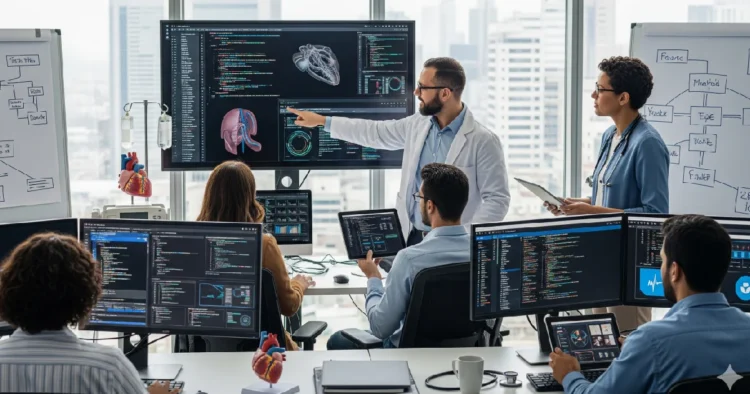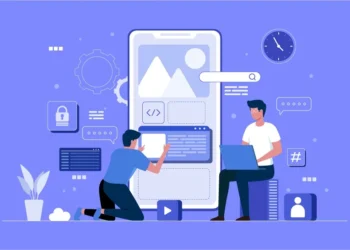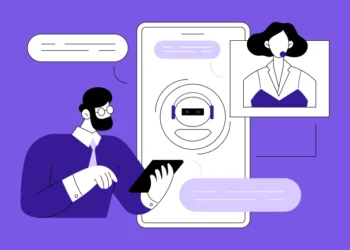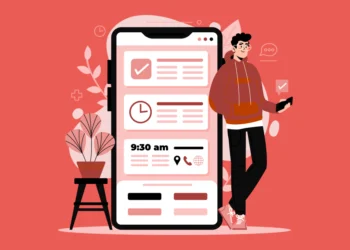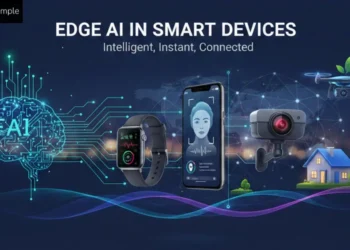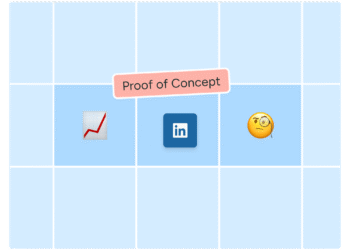Have you ever considered how drastically technology can change, allowing you to access AI, data security, and patient care all in one powerful healthcare app? Medical software is a digital tool designed to streamline healthcare operations, encompassing patient management systems, diagnostic tools, and telehealth apps.
If you are someone interested in healthcare startups, developers, or healthcare leaders looking to learn how to build effective medical software in today’s competitive and regulated market, this is the right place.
There are hundreds of technologies available nowadays, so from choosing the right one to the step-by-step process of growing a stable and growing healthcare app, you’ll learn everything here.
What is Medical Software Development?
Medical software development is a process of building apps related to the healthcare industry. It’s not like any other app development, but in the medical line, you have to be more accurate, perfect, privacy-conscious, and fast. These apps offer numerous tools to help hospitals, clinics, and doctors manage their operations more efficiently, deliver better patient care, and minimise human errors.
Whether it’s booking appointments, storing patient health records, offering remote consultations, or generating medical bills, everything can be managed through well-designed medical software.
10 Types of Medical Software Development Solutions

The healthcare industry relies on a wide range of software solutions, each designed to serve a specific purpose, some managing hospitals and some offering remote consultations. Here are 10 key types of medical software development solutions in 2025.
1. Electronic Health Records (EHR/EMR) Software
This type of software manages the entire history of each patient, including all test reports over time, treatment records, and updates on medications. In short, it has the track record of each patient from day one.
2. Telemedicine Software
This software has only one specific, yet most important, purpose, which is to connect doctors and patients remotely. There are many ways to do it, such as video calls, audio calls or, if you are an introvert, a chat system is also available. Patients can consult doctors without visiting the hospital, making healthcare more accessible, especially in remote areas.
3. Hospital Management Systems (HMS)
A complete software that manages hospital operations like staff scheduling, room availability, patient admissions, billing, and inventory. It helps hospitals run more efficiently.
4. Medical Billing and Invoicing Software
These types of software are used to create bills, manage payments, and handle insurance claims. It helps reduce paperwork, minimise billing errors, and speed up payment processing.
5. ePrescription Software
ePrescription Software enables doctors to send digital prescriptions directly to a pharmacy. This smart move reduces the risk of errors and ensures the patient receives the correct medication.
6. Patient Portals
These are online platforms where patients can log in to see their health records, book appointments, download reports, and even message their doctor. It helps in improving communication between doctors and patients.
7. Clinical Decision Support Systems (CDSS)
AI-based tools that help doctors make better decisions. They analyse patient data and suggest possible diagnoses or treatment options based on medical guidelines.
8. Radiology & Imaging Software
Helps doctors view and analyse images from X-rays, MRIs, or CT scans. These tools often utilise AI to detect problems more quickly and accurately.
9. Medical Research & Clinical Trials Software
Used during research and clinical trials to collect and manage large amounts of data. It helps researchers track results and generate accurate reports.
10. Fitness & Wellness Apps
These apps help users track their health daily, like monitoring heart rate, sleep, physical activity, and medication reminders. It promotes better self-care and preventive health.
Key Features Every Medical Software Must Have

Medical software should be secure, reliable, and easy to use because it directly impacts patient lives and healthcare quality. These are some must-have features in medical software.
1. Data Security & Privacy
Medical data is the most sensitive data globally, so privacy takes precedence. Every medical software should follow regulations such as HIPAA and GDPR. Some essential measures for addressing privacy concerns include encryption, access control, and audit logs.
2. User-Friendly Interface
The interface should be easy because the software is not only for doctors but also for patients who are using it for the first time. So keep the UI simple so that people of all age groups can use it easily.
3. Cloud-Based & Multi-Device Access
There should be no restrictions on the app’s medium. Users should be able to log in from any device, at any time, anywhere. Using cloud-based access ensures that data is synced and available in real-time.
4. Real-Time Updates & Notifications
Real-time updates for patients should be delivered on time via notifications. Important alerts, such as appointment reminders, test results, or emergency updates, must be sent instantly to users through SMS, email, or in-app notifications.
5. Customizable & Scalable Design
Every hospital or clinic has different needs. The software should be flexible enough to customise and scalable enough to handle growth or new features in the future.
6. Role-Based Access Control
This software is crucial for all, but not for every user. Boundaries should be there according to the role of each user. Different users, such as doctors, administrators, nurses, and patients, require varying levels of access. Role-based permissions ensure only the right people see the correct data.
7. Offline Functionality
The medical line is all about perfect timing, and it should be used as early as possible. In the event of no internet connection, the software should allow basic features to function offline and sync automatically when the internet connection is restored.
Key Benefits of Medical Software Development

1. Better Patient Care
Medical software gives the doctor and patient easy access to each other. Every patient has a unique account, making it easy to view their history, reports, or prescriptions. It helps in doing the diagnosis fast and accurately.
2. Fewer Human Errors
There should be no chance of a mistake in the medical line; it’s about life and death, after all. The automated system in this software reduces manual mistakes.
3. Saves Time
Tasks such as appointment booking, billing, and report creation become automated. This saves time for both hospital staff and patients.
4. Secure Data Management
In medical software, patient data is stored safely using encryption. The software also adheres to necessary privacy regulations, such as HIPAA, ensuring comprehensive data protection.
5. Remote Monitoring
Medical software allows doctors to consult patients online. This is particularly useful for individuals in remote areas or those with limited mobility.
Conclusion
Medical software is something that can significantly impact our daily lives, making it a must-have. From improving patient care to enhancing hospital operations, the right software can dramatically transform the way medical services are delivered.
If you’re looking for medical software development in Bangalore, it’s essential to partner with a team that understands both technology and healthcare. Many trusted companies offering software development services in Bangalore are now creating innovative, secure, and user-friendly tools to meet the growing demands of the medical field.

